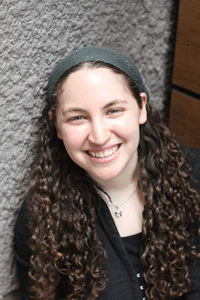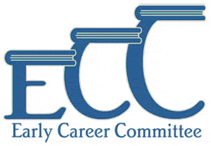
Navah Wolfe, Associate Editor at Simon and Schuster Books for Young Readers | June 5, 2013

How long have you worked at Simon & Schuster?
I’ve been at Simon & Schuster my whole career!
Officially, I’ve been here for six years. I started as an editorial assistant at Simon & Schuster Books for Young Readers in 2007, but my S&S roots actually go a little farther back — I was an intern at Aladdin in 2005.
What was your first job in children’s publishing? How did you come to editorial?
My first ever publishing internship was at WW Norton, where I worked in the college science textbook department. That’s where I learned that I loved publishing but didn’t love college science textbooks. My second internship was at Aladdin, where I got to work on picture books and middle grade novels. I knew from the moment I started that I wanted to work in children’s editorial, and after a bit of a roundabout path (including spending a year working at the zoo, and some time bookselling at Books of Wonder), I was lucky enough to find a home as an editorial assistant at Simon & Schuster Books for Young Readers.
What was the first manuscript you worked on?
The first manuscript I ever worked on with my boss was My So-Called Family by Courtney Sheinmel, a pitch-perfect middle grade novel about a girl who’s trying to find the side of a family she never knew she had, with a twist — because she doesn’t have a father, she has a sperm donor. And when she discovers she might have half siblings from her donor-dad, she’s dying to meet them. But the first book I acquired by myself was The Unnaturalists by Tiffany Trent, a gorgeous fantasy that wonders what would happen if Victorians ended up in Fairyland.
How did you make the transition through the ranks of editorial?
My job has changed over the years as I have grown my list and learned how to stretch time in ways I never thought possible.
Can you describe your typical day?
My day starts with a giant cup of tea (usually peach oolong, the tea of champions!) and then I consult my to-do list. Those are pretty much the only things that are the same from day to day. After that, each day is so different. Some days (rarer than I’d like) I get to hide in my editorial cave and focus on a manuscript, but usually there’s paperwork to be routed, copy to be written, passes to be reviewed, meetings to be attended, people to talk to, and a million little details that need to be handled.
What’s the best piece of advice you ever received?
Don’t be afraid to ask questions and don’t be shy about having good ideas.
What skills do you think are indispensable to working in editorial?
I think it’s crucial to have confidence in your opinions and taste. And you have to love your books passionately enough to convince everyone else to love them too. It’s also essential to have a killer organizational system. For me, my life is my to-do list — that’s my time turner. It keeps me focused on what needs to get done, and makes it easy for me to see at a glance what’s top priority without losing track of lower priority-but-equally-important tasks.
What is one of the worst (it doesn’t have to be the worst) mistake you’ve made? How did you get beyond it?
Definitely the worst mistake I’ve made is not asking enough questions. When you’re not sure of something, don’t keep muddling through — ask, find out the answers, and then you’ll know forever!
Any funny, interesting, surprising anecdotes (about your own experience or publishing in general) you want to share?
You get to meet a lot of celebrities and authors you admire when you work in this industry, and 99.9% of the time I’m pretty good at staying cool and being professional. And then Susan Cooper came into the office, and I’m pretty sure I said something along the lines of “Hi, I’m Navah Wolfe, and you changed my life.” It was amazing.
What is your favorite word?
Philomath. It means “Lover of Knowledge”.
What is your favorite industry-related website or blog?
Twitter! I find that all the most useful industry news gets tweeted, plus it’s a great way to build relationships with people and keep a finger on the pulse of the industry. Oh, and I also love the Life in Publishing Tumblr.
How do you use twitter for editorial purposes?
I think it’s important not to just be a self-promoter on Twitter. Of course it’s a valuable space to promote books and authors that you’re excited about, but I think it’s also important to be a person there. I’ve made good friends on Twitter, and I’ve met agents who I’ve bought books from.
What are you reading now? Or what was the last book you really enjoyed?
I actually just finished reread The Wednesday Wars by Gary D. Schmidt for the eleventeeth time. It’s one of my favorite books, and I highly recommend it.
Recent years have seen a rise in picture-book biographies. Were your life ever to be chronicled in such a way, and don’t be modest now, who would you choose to illustrate it?
I’m going to answer this like the fantasy question it is, and say Trina Schart Hyman. She’s my favorite illustrator, and I harbor a secret desire to collect a copy of everything she’s ever done. I think she’s brilliant.
You have two kids. Have they changed your perspective on publishing?
They’ve definitely changed my perspective on picture books! Before I had kids, what I thought made a great picture book was very different from what I think makes a great picture book now. My daughter is two and a half, and the books that were perfect for her a year ago, or six months ago, are different from the ones that are perfect for her now — and I’m sure that will keep changing! Reading bedtime books every night has been a great way for me to get to know picture books in a totally different way than I do as an editor.
I’ve heard you read over 100 books last year. How on earth do you do it?
I think it’s really valuable to read books outside of the ones I’m working on. It can be easy to get jaded and overwhelmed with all the work reading we do, but I think it’s really important to remind myself every now and then how much I love books. So I carefully find the time to read for fun sometimes — though admittedly I have less and less of that time the busier my life gets. (So far, I’ve read 33 books this year, down from 47 this time last year). But I think that will always be important to me.







